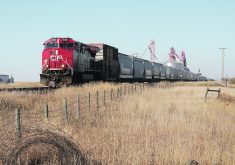Federal consultations on the rail freight sector have begun with industry players.
Transport Canada is holding roundtable meetings with various stakeholders as a result of the National Supply Chain Task Force report released a year ago.
That report made a number of recommendations with varying time frames for action. These included establishing a supply chain office, developing a long-term transportation supply chain strategy that includes modernized regulations and a supply chain labour strategy.
Read Also

Huge Black Sea flax crop to provide stiff competition
Russia and Kazakhstan harvested huge flax crops and will be providing stiff competition in China and the EU.
The report recommended expanded interswitching, and that provision was included in the budget bill C-47, which received royal assent in June. At the time, a coalition of commodity organizations welcomed the development.
“The potential long-term benefits of extended regulated interswitching are well-recognized, and we look forward to working with the government over the next 18 months to develop a path that leads to the extension of the distance and the permanent integration of this policy into Canada’s transportation network,” the Flip the Switch coalition said.
Several stakeholders said they weren’t yet prepared to comment on the rail freight review, which will also look at the Maximum Revenue Entitlement. However, they did plan to make submissions and meet with officials.
The MRE was not mentioned in the task force report.
Mark Hemmes from grain monitor Quorum Corp. said the company is not directly involved in the review. However, he said the MRE always warrants industry attention when it comes up in a policy review.
“I believe the grain companies will certainly make the protection of the MRE a top priority, as should producers,” he said.
Transport Canada said the review is focusing on a suite of issues “to ensure the economic framework governing the federal freight rail sector continues to meet the needs of Canada’s supply chains.”
The main areas of focus will be efficiency of the sector, the role of the Canadian Transportation Agency, long-term investments in the rail network and integration of short-line carriers.
The department said consultations and analysis of the MRE will ensure the policy is “meeting its objective and remains fit for purpose.”
Meetings are continuing until the end of the month and submissions are due by mid November.


















